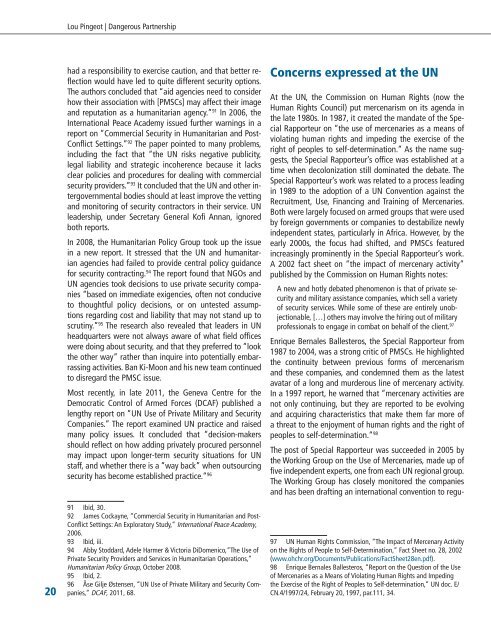Dangerous Partnership
Dangerous Partnership
Dangerous Partnership
Create successful ePaper yourself
Turn your PDF publications into a flip-book with our unique Google optimized e-Paper software.
20<br />
Lou Pingeot | <strong>Dangerous</strong> <strong>Partnership</strong><br />
had a responsibility to exercise caution, and that better reflection<br />
would have led to quite different security options.<br />
The authors concluded that “aid agencies need to consider<br />
how their association with [PMSCs] may affect their image<br />
and reputation as a humanitarian agency.” 91 In 2006, the<br />
International Peace Academy issued further warnings in a<br />
report on “Commercial Security in Humanitarian and Post-<br />
Conflict Settings.” 92 The paper pointed to many problems,<br />
including the fact that “the UN risks negative publicity,<br />
legal liability and strategic incoherence because it lacks<br />
clear policies and procedures for dealing with commercial<br />
security providers.” 93 It concluded that the UN and other intergovernmental<br />
bodies should at least improve the vetting<br />
and monitoring of security contractors in their service. UN<br />
leadership, under Secretary General Kofi Annan, ignored<br />
both reports.<br />
In 2008, the Humanitarian Policy Group took up the issue<br />
in a new report. It stressed that the UN and humanitarian<br />
agencies had failed to provide central policy guidance<br />
for security contracting. 94 The report found that NGOs and<br />
UN agencies took decisions to use private security companies<br />
“based on immediate exigencies, often not conducive<br />
to thoughtful policy decisions, or on untested assumptions<br />
regarding cost and liability that may not stand up to<br />
scrutiny.” 95 The research also revealed that leaders in UN<br />
headquarters were not always aware of what field offices<br />
were doing about security, and that they preferred to “look<br />
the other way” rather than inquire into potentially embarrassing<br />
activities. Ban Ki-Moon and his new team continued<br />
to disregard the PMSC issue.<br />
Most recently, in late 2011, the Geneva Centre for the<br />
Democratic Control of Armed Forces (DCAF) published a<br />
lengthy report on “UN Use of Private Military and Security<br />
Companies.” The report examined UN practice and raised<br />
many policy issues. It concluded that “decision-makers<br />
should reflect on how adding privately procured personnel<br />
may impact upon longer-term security situations for UN<br />
staff, and whether there is a “way back” when outsourcing<br />
security has become established practice.” 96<br />
91 Ibid, 30.<br />
92 James Cockayne, “Commercial Security in Humanitarian and Post-<br />
Conflict Settings: An Exploratory Study,” International Peace Academy,<br />
2006.<br />
93 Ibid, iii.<br />
94 Abby Stoddard, Adele Harmer & Victoria DiDomenico,“The Use of<br />
Private Security Providers and Services in Humanitarian Operations,”<br />
Humanitarian Policy Group, October 2008.<br />
95 Ibid, 2.<br />
96 Åse Gilje Østensen, “UN Use of Private Military and Security Companies,”<br />
DCAF, 2011, 68.<br />
Concerns expressed at the UN<br />
At the UN, the Commission on Human Rights (now the<br />
Human Rights Council) put mercenarism on its agenda in<br />
the late 1980s. In 1987, it created the mandate of the Special<br />
Rapporteur on “the use of mercenaries as a means of<br />
violating human rights and impeding the exercise of the<br />
right of peoples to self-determination.” As the name suggests,<br />
the Special Rapporteur’s office was established at a<br />
time when decolonization still dominated the debate. The<br />
Special Rapporteur’s work was related to a process leading<br />
in 1989 to the adoption of a UN Convention against the<br />
Recruitment, Use, Financing and Training of Mercenaries.<br />
Both were largely focused on armed groups that were used<br />
by foreign governments or companies to destabilize newly<br />
independent states, particularly in Africa. However, by the<br />
early 2000s, the focus had shifted, and PMSCs featured<br />
increasingly prominently in the Special Rapporteur’s work.<br />
A 2002 fact sheet on “the impact of mercenary activity”<br />
published by the Commission on Human Rights notes:<br />
A new and hotly debated phenomenon is that of private security<br />
and military assistance companies, which sell a variety<br />
of security services. While some of these are entirely unobjectionable,<br />
[…] others may involve the hiring out of military<br />
professionals to engage in combat on behalf of the client. 97<br />
Enrique Bernales Ballesteros, the Special Rapporteur from<br />
1987 to 2004, was a strong critic of PMSCs. He highlighted<br />
the continuity between previous forms of mercenarism<br />
and these companies, and condemned them as the latest<br />
avatar of a long and murderous line of mercenary activity.<br />
In a 1997 report, he warned that “mercenary activities are<br />
not only continuing, but they are reported to be evolving<br />
and acquiring characteristics that make them far more of<br />
a threat to the enjoyment of human rights and the right of<br />
peoples to self-determination.” 98<br />
The post of Special Rapporteur was succeeded in 2005 by<br />
the Working Group on the Use of Mercenaries, made up of<br />
five independent experts, one from each UN regional group.<br />
The Working Group has closely monitored the companies<br />
and has been drafting an international convention to regu-<br />
97 UN Human Rights Commission, “The Impact of Mercenary Activity<br />
on the Rights of People to Self-Determination,” Fact Sheet no. 28, 2002<br />
(www.ohchr.org/Documents/Publications/FactSheet28en.pdf).<br />
98 Enrique Bernales Ballesteros, “Report on the Question of the Use<br />
of Mercenaries as a Means of Violating Human Rights and Impeding<br />
the Exercise of the Right of Peoples to Self-determination,” UN doc. E/<br />
CN.4/1997/24, February 20, 1997, par.111, 34.


